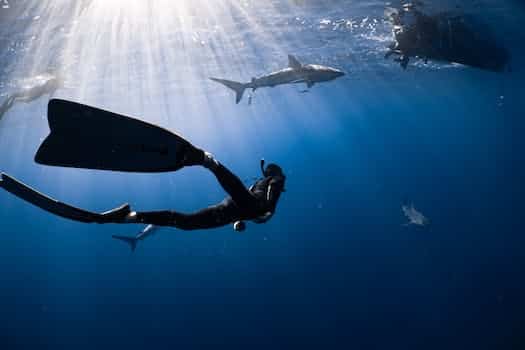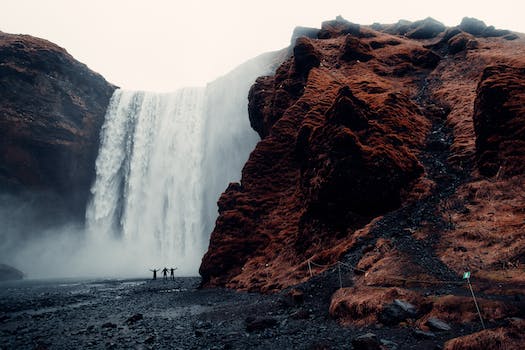When it comes to scuba diving, choosing the right certification can make a world of difference in your underwater adventures. Two popular options for divers looking to further their skills are the Adventure Diver and the Advanced Open Water certifications. In this article, we will explore the differences between these two certifications and help you make an informed decision on which one is the perfect fit for you.
- 1. Introduction
- 1.1. Definition of Adventure Diver
- 1.2. Definition of Advanced Open Water
- 1.3. Importance of Diving Certifications
- 1.4. Overview of Adventure Diver Course
- 1.5. Overview of Advanced Open Water Course
- 2. Skills and Training
- 2.1. Required Skills for Adventure Diver
- 2.2. Required Skills for Advanced Open Water
- 2.3. Training and Certification Process for Adventure Diver
- 2.4. Training and Certification Process for Advanced Open Water
- 2.5. Differences in Skills Acquired
- 3. Diving Limitations and Opportunities
1. Introduction
When it comes to scuba diving, choosing the right certification can be a daunting task. Two popular options for divers looking to advance their skills are the Adventure Diver and Advanced Open Water certifications. Both certifications offer unique opportunities to explore the underwater world and improve diving abilities. In this article, we will compare Adventure Diver and Advanced Open Water certifications to help you make an informed decision on the perfect dive certification for you.
1.1. Definition of Adventure Diver
The Adventure Diver certification is a scuba diving certification offered by the Professional Association of Diving Instructors (PADI). It is a step towards becoming a more experienced and skilled diver. This certification allows divers to explore different areas of interest in scuba diving and gain more knowledge and experience in specific areas. The Adventure Diver course includes three adventure dives chosen from a list of options, such as underwater photography, wreck diving, night diving, and deep diving. Each adventure dive focuses on a particular skill or aspect of diving, allowing divers to expand their capabilities and interests. The Adventure Diver certification is a great way for divers to customize their diving experiences and further their underwater exploration.
1.2. Definition of Advanced Open Water
The Advanced Open Water Diver certification is an advanced level scuba diving certification offered by several diving organizations. It is designed for divers who have already obtained their Open Water Diver certification and want to further enhance their knowledge and skills in various diving specialties. This certification allows divers to explore a wider range of dive sites and engage in more challenging underwater activities.
The Advanced Open Water Diver certification builds upon the basic skills and knowledge acquired during the Open Water Diver course. It typically includes a series of five adventure dives, each focusing on a different specialty area such as deep diving, underwater navigation, night diving, underwater photography, and more.
During the Advanced Open Water course, divers gain practical experience and learn advanced techniques related to the chosen adventure dives. They are guided by experienced instructors who provide valuable insights and help divers expand their diving capabilities.
Upon completion of the course, divers receive the Advanced Open Water Diver certification, which is recognized worldwide. This certification enables divers to dive to deeper depths (up to 30 meters/100 feet) and participate in more challenging dives with higher levels of confidence and competence.
In summary, the Advanced Open Water Diver certification is a progressive step for divers who wish to broaden their diving skills beyond the basic level. It offers the opportunity to explore new diving specialties, gain practical experience, and become a more proficient and confident diver.
1.3. Importance of Diving Certifications
Diving certifications play a crucial role in ensuring the safety and proficiency of divers. These certifications are not only important for personal growth and development, but they also demonstrate a diver’s commitment to the sport and their ability to handle various underwater situations. Without proper certifications, divers may lack the necessary knowledge and skills to dive safely and effectively.
In this article, we will explore the significance of diving certifications and specifically compare the Adventure Diver and Advanced Open Water certifications. By understanding the importance of these certifications, divers can make an informed decision when choosing the perfect certification for their diving goals and aspirations.
1.4. Overview of Adventure Diver Course
The Adventure Diver course is an exciting opportunity for divers to expand their skills and knowledge in specific areas of interest. This course allows divers to choose three different adventure dives from a wide range of options, such as deep diving, navigation, underwater photography, wreck diving, and many more. It is a great way to gain experience and confidence in various diving specialties.
Unlike the Advanced Open Water certification, which requires completing five adventure dives, the Adventure Diver course allows divers to focus on their specific interests without the need for additional dives. This makes it a more flexible option for those who have limited time or specific diving goals.
The Adventure Diver course provides a solid foundation and can be a stepping stone towards the Advanced Open Water certification. Divers who complete three adventure dives can later upgrade their certification by completing two more adventure dives and the necessary theory modules. This progression allows divers to gradually build their skills and experience while exploring different aspects of diving.
Overall, the Adventure Diver course offers divers the opportunity to tailor their diving education to their interests and goals. Whether you want to explore underwater wrecks, improve your buoyancy control, or learn underwater navigation techniques, the Adventure Diver course provides a structured and comprehensive approach to expanding your diving capabilities.
1.5. Overview of Advanced Open Water Course
The Advanced Open Water course is an exciting and challenging dive certification that allows divers to enhance their skills and experience in various diving environments. This course is designed for individuals who have already obtained their Open Water certification and want to take their diving abilities to the next level. It offers a wide range of specialized diving activities and provides divers with a deeper understanding of the underwater world.
During the Advanced Open Water course, divers will participate in five adventure dives, each focusing on a different aspect of diving. These dives include deep diving, underwater navigation, night diving, peak performance buoyancy, and a choice of various other specialty dives such as wreck diving, drift diving, or fish identification. The course aims to improve divers’ confidence, knowledge, and competence in different diving conditions.
Unlike the Adventure Diver certification, which only requires three adventure dives, the Advanced Open Water course provides divers with a more comprehensive education. It allows divers to explore different types of diving and gain a broader range of skills. By completing this course, divers will be able to dive to a maximum depth of 30 meters, compared to the 18-meter limit of the Adventure Diver certification.
Overall, the Advanced Open Water course is a fantastic opportunity for divers to expand their diving horizons and become more adept at various diving techniques. It is the perfect choice for those who are looking to challenge themselves and dive with greater confidence and competence.
2. Skills and Training
When it comes to choosing the perfect dive certification, understanding the skills and training involved is crucial. Both the Adventure Diver and Advanced Open Water certifications offer unique opportunities for divers to enhance their knowledge and abilities in the underwater world.
The Adventure Diver certification focuses on specific dive specialties, allowing divers to explore various areas of interest. This certification requires three dives, which can be chosen from a list of options including underwater photography, wreck diving, night diving, and more. Each dive specialty provides divers with valuable skills and techniques that are essential for specific diving environments.
On the other hand, the Advanced Open Water certification is designed to broaden divers’ horizons and develop their overall diving abilities. This certification consists of five adventure dives, two of which are mandatory: Deep Diving and Underwater Navigation. The remaining three dives can be chosen from a wide range of options such as drift diving, fish identification, peak performance buoyancy, and more. By completing these dives, divers gain a deeper understanding of different aspects of diving and become more competent in various conditions.
Ultimately, the choice between Adventure Diver and Advanced Open Water depends on the diver’s goals and interests. If a diver wants to specialize in specific areas of diving, the Adventure Diver certification would be a suitable choice. On the other hand, if a diver wishes to expand their diving skills and gain a more well-rounded experience, the Advanced Open Water certification is the way to go. Both certifications offer unique benefits and opportunities for divers to continue their underwater adventures.
2.1. Required Skills for Adventure Diver
Required Skills for Adventure Diver:
1. Basic swimming skills: As an adventure diver, it is essential to have basic swimming abilities to navigate through the water confidently.
2. Underwater navigation: Adventure divers should possess good underwater navigation skills to explore dive sites and safely return to the starting point.
3. Buoyancy control: Maintaining proper buoyancy control is crucial for adventure divers to dive comfortably and minimize impacts on the underwater environment.
4. Equipment management: Being able to properly handle and manage diving equipment is necessary for adventure divers to ensure a safe and enjoyable diving experience.
5. Communication: Adventure divers should be proficient in underwater communication techniques, such as hand signals, to effectively communicate with their dive buddies and instructors.
6. Emergency procedures: Having knowledge of emergency procedures and being prepared to handle potential diving emergencies is a crucial skill for adventure divers to ensure their safety and the safety of others.
7. Dive planning: Adventure divers should be capable of planning dives, including considering factors like depth, time limits, and potential hazards, to ensure a successful and enjoyable diving experience.
These skills are essential for any adventure diver and should be developed and practiced through proper training and experience.
2.2. Required Skills for Advanced Open Water
To pursue the Advanced Open Water certification, there are certain skills that a diver must possess. These skills are essential for ensuring a safe and enjoyable diving experience. Here are some of the required skills for Advanced Open Water:
1. Buoyancy Control: A diver should have excellent control over their buoyancy to navigate underwater environments effectively. This skill is crucial for conserving energy, avoiding damage to marine life, and maintaining proper body positioning.
2. Navigation: Advanced Open Water divers should be proficient in underwater navigation techniques. This involves using a compass, natural navigation cues, and dive site mapping to navigate accurately and confidently.
3. Deep Diving: The Advanced Open Water certification allows divers to explore depths of up to 30 meters (100 feet). Therefore, divers should have the necessary skills and knowledge to safely conduct dives at greater depths.
4. Underwater Communication: Communication underwater is vital for safety and coordination during dives. Advanced Open Water divers should be able to use hand signals, dive slate, and other forms of non-verbal communication effectively.
5. Dive Planning and Management: Divers should have a thorough understanding of dive planning and management techniques. This includes assessing dive conditions, calculating dive profiles, monitoring gas consumption, and executing emergency procedures if needed.
These are just a few examples of the skills required for the Advanced Open Water certification. It is important for divers to continuously practice and improve these skills to become proficient and confident divers.
2.3. Training and Certification Process for Adventure Diver
The training and certification process for becoming an Adventure Diver involves several steps. Firstly, aspiring Adventure Divers must complete a knowledge development portion, which can be done through self-study using the Adventure Diver manual or by attending a classroom session. This portion covers essential diving theories such as dive planning, equipment selection, and underwater communication.
Once the knowledge development is complete, divers move on to the practical training sessions. These sessions take place in a controlled environment, such as a swimming pool or confined water area. Here, divers will practice and master various skills, including buoyancy control, underwater navigation, and emergency procedures.
After successfully completing the knowledge development and practical training, divers are required to participate in a minimum of three Adventure Dives. These dives are conducted under the supervision of a certified instructor and allow divers to apply their learned skills in real-world diving scenarios.
Upon completion of the knowledge development, practical training, and Adventure Dives, divers will receive the Adventure Diver certification. This certification allows divers to dive to a maximum depth of 30 meters (100 feet) under the supervision of a dive professional.
It is important to note that the Adventure Diver certification is just the first step in the PADI system. Divers who wish to further their skills and knowledge can continue their education by enrolling in the Advanced Open Water course, which offers more extensive training and certification opportunities.
2.4. Training and Certification Process for Advanced Open Water
The training and certification process for the Advanced Open Water course is designed to enhance and expand your diving skills beyond the basic level. It provides divers with the opportunity to gain more experience and confidence in various diving situations. Before embarking on the Advanced Open Water course, it is necessary to have already obtained the Open Water certification.
The Advanced Open Water course consists of both theoretical knowledge and practical skills. The theory portion typically involves self-study using the provided course materials, including manuals and online resources. It covers topics such as deep diving, underwater navigation, night diving, search and recovery, and more.
Once you have completed the required reading and knowledge reviews, you will participate in five adventure dives. These dives are conducted under the guidance of a certified instructor who will help you apply what you have learned in the theory portion.
During the adventure dives, you will have the opportunity to practice and refine your skills in different diving scenarios. These dives can include deep dives to explore greater depths, night dives to experience the underwater world in a different light, and navigation dives to improve your ability to navigate underwater.
After completing the five adventure dives, you will receive the Advanced Open Water certification. This certification is recognized worldwide and allows you to dive up to a maximum depth of 30 meters (100 feet) independently or with a dive buddy.
The Advanced Open Water certification is a great way to further your diving knowledge and skills. It opens up new possibilities for exploring underwater environments and allows you to dive with increased confidence and proficiency.
2.5. Differences in Skills Acquired
When it comes to acquiring skills and training in the world of diving, there are significant differences between the Adventure Diver and Advanced Open Water certifications. Both certifications offer unique benefits and cater to different diving interests and goals.
The Adventure Diver certification focuses on diving in specific areas of interest, allowing divers to gain expertise in those particular skills. It offers a more flexible approach, as divers can choose three specialty dives from a range of options such as underwater photography, wreck diving, or fish identification. This certification is perfect for divers who want to explore specific aspects of diving and enhance their knowledge in those areas.
On the other hand, the Advanced Open Water certification provides a broader and more comprehensive diving education. It includes five adventure dives, including deep diving and navigation, alongside three additional specialty dives. This certification is ideal for divers seeking a well-rounded training that covers various diving skills and techniques.
While both certifications require a certain level of prior training, the Adventure Diver certification has a lower prerequisite, making it accessible to divers with less experience. It is a great stepping stone for those who have just completed their Open Water certification and want to expand their diving abilities.
In contrast, the Advanced Open Water certification demands a higher level of expertise and is recommended for divers who have already gained some experience after their initial certification. It provides an opportunity to develop more advanced skills and build confidence in various diving scenarios.
Ultimately, the choice between Adventure Diver and Advanced Open Water certifications depends on the diver’s personal preferences and goals. Whether one seeks to specialize in particular diving areas or desires a more comprehensive training, both certifications offer valuable skills and the chance to explore the underwater world with confidence and proficiency.
3. Diving Limitations and Opportunities
Diving Limitations and Opportunities
When it comes to choosing the perfect dive certification, two popular options often come up: Adventure Diver and Advanced Open Water. Both certifications offer unique opportunities and have their own limitations.
The Adventure Diver certification is a great choice for those who want to explore specific dive interests. With this certification, divers can choose three specialty dives from a wide range of options such as night diving, underwater photography, or wreck diving. This allows divers to focus on areas that interest them the most and gain valuable experience in those specific areas.
However, it’s important to note that the Adventure Diver certification has some limitations. It is not as comprehensive as the Advanced Open Water certification, as it only requires three specialty dives compared to the five dives required for the Advanced Open Water. This means that divers with the Adventure Diver certification may not have the same level of proficiency in all aspects of diving.
On the other hand, the Advanced Open Water certification offers a more well-rounded diving education. In addition to the three specialty dives, divers must complete two core dives: deep diving and underwater navigation. These core dives provide divers with essential skills and knowledge that are crucial for safe and successful diving.
With the Advanced Open Water certification, divers have the opportunity to explore different diving environments and gain a deeper understanding of the underwater world. They can choose from a variety of elective dives such as drift diving, boat diving, or search and recovery diving. This allows divers to broaden their diving skills and explore new interests.
In terms of limitations, the Advanced Open Water certification requires a higher level of commitment and time investment compared to the Adventure Diver certification. Divers must complete knowledge reviews and pass exams for each dive, which requires additional studying and preparation.
In conclusion, both the Adventure Diver and Advanced Open Water certifications have their own limitations and opportunities. The Adventure Diver certification is ideal for those who want to specialize in specific areas of diving, while the Advanced Open Water certification offers a more comprehensive and well-rounded diving education. It ultimately depends on individual preferences and goals when choosing the perfect dive certification.
3.1. Diving Limitations for Adventure Diver
As an Adventure Diver, there are certain diving limitations that you need to be aware of. While it is an exciting certification that allows you to explore the underwater world, there are certain restrictions in terms of depth and equipment usage. Adventure Divers are limited to a maximum depth of 30 meters (100 feet) for their dives, which means you won’t be able to go as deep as Advanced Open Water divers who have a maximum depth limit of 40 meters (130 feet).
Additionally, Adventure Divers have limitations when it comes to equipment usage. They are not allowed to use certain advanced diving equipment like dive computers or underwater scooters, which are permitted for Advanced Open Water divers. This means that Adventure Divers may have to rely more on their dive tables and traditional dive planning methods.
Despite these limitations, Adventure Divers still have plenty of opportunities to enjoy the underwater world. They can explore a wide range of dive sites, including wrecks, reefs, and underwater caves, as long as they stay within the depth and equipment usage limits. Adventure Divers can also participate in various specialty dives, such as underwater photography, fish identification, or night diving, which allow them to enhance their diving skills and knowledge.
When choosing between Adventure Diver and Advanced Open Water certifications, it’s essential to consider your diving goals and preferences. If you want to dive deeper and have access to advanced diving equipment, then Advanced Open Water certification might be the better choice. However, if you’re primarily interested in exploring different dive sites and participating in specialty dives, Adventure Diver certification can still provide you with a fulfilling diving experience.
3.2. Diving Limitations for Advanced Open Water
Diving Limitations for Advanced Open Water
When it comes to the Advanced Open Water certification, there are certain diving limitations that divers should be aware of. While this certification allows for more exploration and adventure underwater, there are still some restrictions to consider.
One of the main limitations is the maximum depth that divers can go to. With the Advanced Open Water certification, divers are allowed to dive up to 30 meters (100 feet). This is deeper than what is allowed with the basic Open Water certification, which limits dives to a maximum depth of 18 meters (60 feet). However, it is important for divers to understand their own limits and capabilities before attempting dives at these depths.
Another limitation to consider is the type of dives that can be done. The Advanced Open Water certification offers divers the opportunity to specialize in different types of dives such as night diving, wreck diving, and underwater navigation. While this opens up new possibilities for exploration, it also means that divers should have the necessary skills and training for these specific types of dives. It is important to be aware of the potential risks and challenges associated with each type of dive before attempting them.
Additionally, it is important to note that the Advanced Open Water certification does not make divers experts or professionals in the field. It is a stepping stone towards further certifications and experience. Divers should always dive within their limits and continue to expand their knowledge and skills through continued education and practice.
Overall, while the Advanced Open Water certification offers divers more opportunities for exploration and adventure, it is crucial to understand and respect the diving limitations that come with it. By doing so, divers can ensure their safety and make the most out of their diving experiences.
3.3. Exploring Dive Sites as an Adventure Diver
As an Adventure Diver, you have a world of dive sites to explore and discover. From vibrant coral reefs to mysterious shipwrecks, there are endless possibilities for exciting underwater adventures. Each dive site offers its own unique characteristics and attractions, making every dive a new and thrilling experience.
However, it’s important to be aware of the limitations that come with being an Adventure Diver. While you have the freedom to dive to a maximum depth of 30 meters/100 feet, you may not have the same level of training and experience as an Advanced Open Water diver.
This means that there may be certain dive sites that are off-limits to you as an Adventure Diver. Some dive sites may require a higher certification level due to their depth, currents, or other challenging conditions. It’s crucial to always prioritize safety and adhere to the dive site’s requirements and recommendations.
Despite these limitations, being an Adventure Diver also presents exciting opportunities. You can still explore a wide range of dive sites that are within your certification limits. There are plenty of amazing dive sites that offer breathtaking marine life, stunning underwater landscapes, and fascinating underwater ecosystems.
By choosing the Adventure Diver certification, you can embark on thrilling diving adventures while building your skills and experience. It’s a stepping stone towards becoming an Advanced Open Water diver, where you’ll have even more opportunities to delve into the depths and explore the underwater world.
3.4. Exploring Dive Sites as an Advanced Open Water Diver
As an Advanced Open Water Diver, you have the opportunity to explore dive sites that may not be accessible to beginner divers. These dive sites often offer more challenging and rewarding experiences, allowing you to push your limits and expand your diving skills.
One of the limitations of being an Advanced Open Water Diver is that there are still certain dive sites and conditions that may be beyond your current level of expertise. It is important to recognize your own abilities and limitations and not attempt dives that are beyond your training or comfort zone.
However, being an Advanced Open Water Diver also opens up a world of opportunities. You can dive deeper, up to 30 meters, which allows you to explore wrecks and dive sites that are located at greater depths. Additionally, you have the opportunity to participate in different specialty dives, such as night diving, underwater photography, or drift diving.
Exploring dive sites as an Advanced Open Water Diver is an exciting and fulfilling experience. It allows you to continue your diving education, gain new skills, and discover the wonders that the underwater world has to offer.
3.5. Opportunities for Adventure and Exploration
Diving is a thrilling activity that allows individuals to explore the underwater world and discover its hidden treasures. Whether you are an adventure seeker or someone looking for a new hobby, there are plenty of opportunities for adventure and exploration in the world of diving.
One of the major advantages of becoming a certified diver is the ability to embark on exciting diving expeditions. From diving in exotic locations with vibrant coral reefs to exploring sunken shipwrecks, the possibilities are endless. Each dive presents a unique opportunity to encounter fascinating marine life and witness the beauty of underwater ecosystems.
Moreover, diving offers an escape from the hustle and bustle of everyday life. It allows divers to disconnect from technology and immerse themselves in a peaceful and serene environment. The tranquility of the underwater world provides a sense of calmness and relaxation that is hard to find elsewhere.
While there are numerous opportunities for adventure in diving, it is important to be aware of the limitations as well. Diving requires proper training and certification to ensure safety and minimize risks. Without the necessary skills and knowledge, divers may face dangerous situations or harm the fragile underwater environment.
To overcome these limitations and make the most of diving opportunities, individuals can consider obtaining certifications such as Adventure Diver or Advanced Open Water. These certifications not only enhance diving skills but also offer a wider range of diving options. Adventure Diver certification allows divers to participate in various specialty dives, such as deep diving, night diving, or underwater photography. On the other hand, Advanced Open Water certification builds upon the skills acquired in the Adventure Diver course and enables divers to explore more challenging dive sites.
Choosing the perfect dive certification depends on personal interests, goals, and level of commitment. Both Adventure Diver and Advanced Open Water certifications open doors to thrilling adventures and provide opportunities for divers to continuously learn and grow in their diving journey.
Conclusion
In conclusion, choosing between the Adventure Diver and Advanced Open Water dive certifications depends on individual preferences and diving goals. While Adventure Diver offers a more flexible and customizable approach, Advanced Open Water provides a more comprehensive and challenging training. It is important to consider factors such as experience, desired diving depth, and future diving aspirations when making the decision. Ultimately, both certifications offer unique benefits and opportunities for divers to enhance their skills and explore the underwater world.





